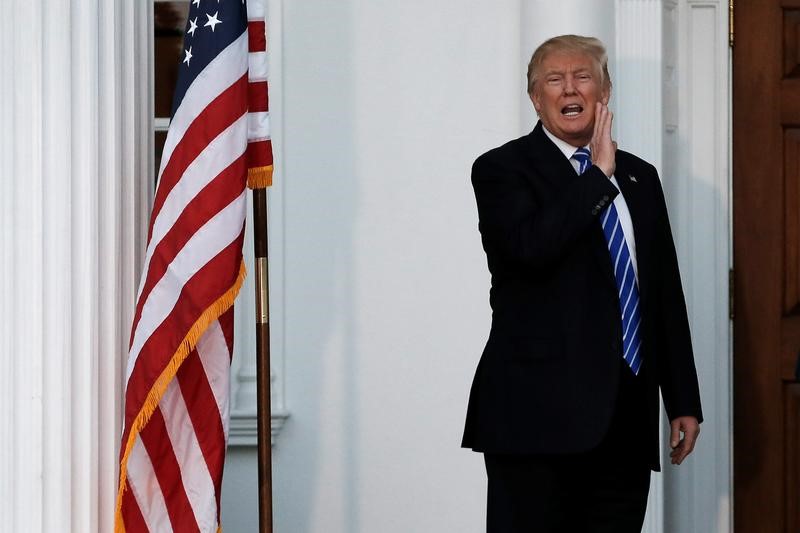Investing.com - Here are the top five things you need to know in financial markets on Wednesday, March 14:
1. Stocks keeping tabs on Trump tariffs, Washington turmoil
U.S. President Donald Trump showed no sign of easing his stance on tariffs amid a Reuters report Tuesday that the president is seeking to impose tariffs on $60 billion of Chinese imports, targeting the technology and telecommunications sectors as part of his campaign to reduce trade deficits.
While the tariffs would be chiefly targeted at information technology, consumer electronics and telecoms, they could be much broader and the list could eventually run to 100 products, the news agency’s source said.
The threat of additional U.S. tariffs could stoke fears of a global trade war and weigh on investor appetite for risker assets at a time when investors are concerned over turmoil in Washington.
After Trump fired Secretary of State Rex Tillerson on Tuesday, some experts have postulated that the President is paving the way for tougher trade and fiscal policies.
The removal of Tillerson spooked stock investors on Tuesday with all three major U.S. benchmarks ending in the red. Those losses spread to Asian equities on Wednesday.
However, U.S. stock futures staged a recovery on Wednesday, pointing to a higher open on Wall Street. At 5:55AM ET (9:55GMT), the blue-chip Dow futures gained 91 points, or 0.36%, S&P 500 futures rose 8 points, or 0.30%, while the Nasdaq 100 futures traded up 30 points, or 0.42%.
European stocks were also trading mostly higher on Wednesday as investors kept an eye on politics. Apart from developments in Washington, Germany reelected Angela Merkel as Chancellor for a fourth term.
2. Focus on retail sales data
On the economic calendar, market participants will focus on the Commerce Department’s release of retail sales for February at 8:30AM ET (12:30GMT) Wednesday.
The consensus forecast is that the report will show retail sales rose 0.3% last month, snapping back after a decline of 0.3% in January.
Core sales are also forecast to inch up 0.3%, after holding flat a month earlier.
Rising retail sales over time correlate with stronger economic growth, while weaker sales signal a declining economy. Consumer spending accounts for as much as 70% of U.S. economic growth.
At the same time on Wednesday and ahead of the Federal Reserve’s decision on interest rates slated for March 21, investors will keep an eye on inflation at the wholesale level.
As measured by the producer price index, wholesale inflation is expected to have cooled to 0.1% in February from 0.4% in the prior month. The expected slowdown in wholesale inflation comes despite the latest ISM survey showing manufacturers saw input costs increase at the fastest pace in seven years.
3. Oil trades higher ahead of input on U.S. supply
OPEC is slated to release its monthly report Wednesday at 7:20AM ET (11:20GMT) which will outline its estimates on global oil demand growth and output.
Non-OPEC output is expected to garner added investor attention after the oil cartel its estimates for rivals outside the group in its previous report. The U.S. made up more than half of the non-OPEC upward revision.
Investors were also watching for signs that Trump's more "hardball" foreign policy tactics could influence oil markets.
A fresh batch of inventory data, meanwhile, from the Energy Information Administration (EIA) on Wednesday at 10:30AM ET (14:30 GMT) is expected to show that U.S. crude stockpiles rose for the third straight week.
Analysts forecast crude inventories rose by about 2.023 million barrels in the week ended March 9.
Late Tuesday, the American Petroleum Institute released its data showing that crude inventories had grown by 1.2 million barrels compared to expectations for a build of 1.5 million barrels.
U.S. crude oil futures rose 0.33% to $60.91 at 5:57AM ET (9:57GMT), while Brent oil gained 0.25% to $64.80.
4. ECB needs more evidence on inflation dynamics
European Central Bank president Mario Draghi said Wednesday that the euro zone monetary authority still needed to see more evidence that inflation was moving toward target before it would consider the removal of monetary stimulus.
“We currently see inflation converging toward our aim over the medium term, and we are more confident than in the past this convergence will come to pass,” Draghi told a conference on Wednesday. “But we still need to see further evidence that inflation dynamics are moving in the right direction,” he added.
Draghi made clear that it would it would be a “very clear condition for us to bring net asset purchases to an end”.
5. Google to ban crypto ads
Alphabet Inc's Google (NASDAQ:GOOGL) said on Wednesday it will ban advertisements for cryptocurrencies and related content starting in June.
Under the new policy, the tech giant explained that it will ban ads for unregulated or speculative financial products like binary options, cryptocurrency and financial spread betting among others.
The announcement added to downward pressure seen the in the cryptocurrency market on Wednesday.
At 5:58AM ET (9:58GMT), Bitcoin, the world's biggest virtual currency by market cap, was down around 1.1% to $9,097.50.
Other major cryptocurrencies were also lower, with Ethereum, the world’s second largest cryptocurrency by market cap, falling about 1.7% to $689.11.
The third largest cryptocurrency Ripple lost roughly 7% to trade at $0.77531.
